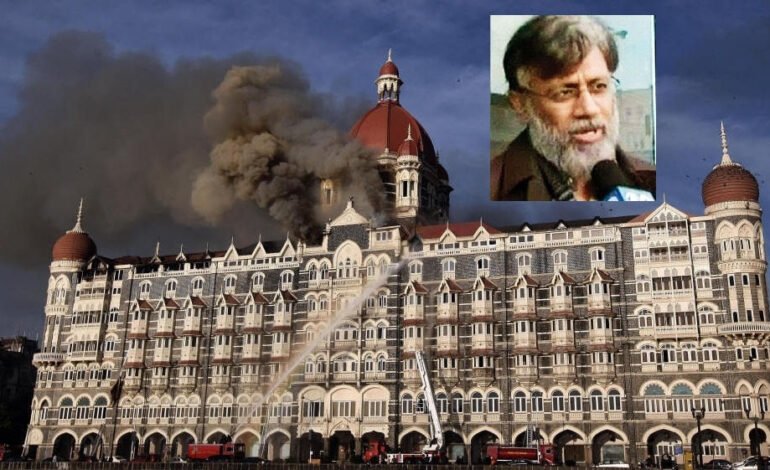
US Supreme Court Rejects Tahawwur Rana’s Extradition Stay: A Milestone in 26/11 Mumbai Attack Accountability
The United States Supreme Court has denied Tahawwur Rana’s emergency application seeking to halt his extradition to India, marking a pivotal moment in the pursuit of justice for the 2008 Mumbai terror attacks. This decision clears the path for Rana, a Canadian national of Pakistani origin, to face trial in India for his alleged involvement in the attacks that claimed 166 lives.
Background: The 26/11 Mumbai Attacks
On November 26, 2008, Mumbai witnessed one of the most devastating terrorist attacks in its history. Over a span of three days, ten members of the Pakistan-based militant group Lashkar-e-Taiba (LeT) carried out coordinated shooting and bombing assaults across multiple locations, including the Taj Mahal Palace Hotel, Oberoi Trident Hotel, Nariman House, and the Chhatrapati Shivaji Maharaj Terminus. The attacks resulted in 166 fatalities and left hundreds injured, sending shockwaves worldwide.
Tahawwur Rana’s Alleged Involvement
Tahawwur Rana, a former Pakistani military doctor who later became a Canadian citizen, is accused of providing logistical support to LeT operatives, facilitating their reconnaissance missions in Mumbai. Rana’s immigration business was allegedly used as a cover to assist David Coleman Headley, another key conspirator, in gathering intelligence on potential targets in Mumbai. While Rana was acquitted in the U.S. for direct involvement in the Mumbai attacks, he was convicted in 2011 for supporting a plot against a Danish newspaper and providing material support to LeT, leading to a 14-year prison sentence.
Legal Proceedings and Extradition Efforts
India has long sought Rana’s extradition to hold him accountable for his alleged role in the 26/11 attacks. In 2020, following the completion of his U.S. prison term, Indian authorities formally requested his extradition. Rana challenged this move, citing potential risks to his safety and health if extradited. He argued that, as a Pakistani-origin Muslim, he would face torture in India and that his medical conditions, including heart issues and chronic ailments, would deteriorate.
Despite these claims, U.S. courts consistently ruled in favor of extradition. In February 2025, President Donald Trump announced the approval of Rana’s extradition during a press conference with Indian Prime Minister Narendra Modi, emphasizing the commitment to bringing perpetrators of terrorism to justice.
Supreme Court’s Decision
Rana’s final legal recourse was an emergency application to the U.S. Supreme Court, seeking a stay on his extradition. He reiterated concerns about potential torture and inadequate medical care in India. However, on March 6, 2025, Associate Justice Elena Kagan denied the application, effectively removing the last legal obstacle to his extradition.
Implications of the Decision
The Supreme Court’s rejection of Rana’s plea is a significant victory for India’s efforts to bring those involved in the 26/11 attacks to justice. It underscores the collaborative efforts between the U.S. and India in combating terrorism and ensuring accountability. For the victims and their families, this development offers a sense of progress toward justice, even as they continue to cope with the tragedy’s aftermath.
International Cooperation Against Terrorism
This case highlights the importance of international cooperation in addressing global terrorism. The U.S. and India’s coordinated efforts in Rana’s extradition process demonstrate a shared commitment to dismantling terrorist networks and holding perpetrators accountable, regardless of where they are found. Such collaboration is crucial in preventing future attacks and promoting global security.
Conclusion
The denial of Tahawwur Rana’s extradition stay by the U.S. Supreme Court marks a pivotal step in the long journey toward justice for the 26/11 Mumbai attacks. As Rana prepares to face trial in India, this development serves as a reminder of the enduring impact of the attacks and the relentless pursuit of accountability. It also exemplifies the strength of international partnerships in combating terrorism and upholding the rule of law.
For the families of the victims and the global community, this decision reinforces the message that those who orchestrate or facilitate acts of terror will be pursued and brought to justice, no matter how long it takes.







1 Comment
A motivating discussion is definitely worth comment.
I do think that you ought to publish more about this subject matter, it might not be
a taboo subject but generally people don’t discuss such topics.
To the next! Cheers!!